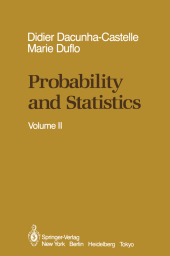 Neuerscheinungen 2012Stand: 2020-01-07 |
Schnellsuche
ISBN/Stichwort/Autor
|
Herderstraße 10
10625 Berlin
Tel.: 030 315 714 16
Fax 030 315 714 14
info@buchspektrum.de |

Didier Dacunha-Castelle, Marie Duflo, David McHale
(Beteiligte)
Probability and Statistics
Volume II
Übersetzung: McHale, David
Softcover reprint of the original 1st ed. 1986. 2012. xiv, 410 S. XIV, 410 pp. 6 figs. 235 mm
Verlag/Jahr: SPRINGER, BERLIN 2012
ISBN: 1-461-29339-1 (1461293391)
Neue ISBN: 978-1-461-29339-2 (9781461293392)
Preis und Lieferzeit: Bitte klicken
How can we predict the future without asking an astrologer? When a phenomenon is not evolving, experiments can be repeated and observations therefore accumulated; this is what we have done in Volume I. However history does not repeat itself. Prediction of the future can only be based on the evolution observed in the past. Yet certain phenomena are stable enough so that observation in a sufficient interval of time gives usable information on the future or the mechanism of evolution. Technically, the keys to asymptotic statistics are the following: laws of large numbers, central limit theorems, and likelihood calculations. We have sought the shortest route to these theorems by neglecting to present the most general models. The future statistician will use the foundations of the statistics of processes and should satisfy himself about the unity of the methods employed. At the same time, we have adhered as closely as possible to present day ideas of the theory of processes. For those who wish to follow the study of probabilities to postgraduate level, it is not a waste of time to begin with the least difficult technical situations. This book for final year mathematics courses is not the end of the matter. It acts as a springboard either for dealing concretely with the problems of the statistics of processes, or viii In trod uction to study in depth the more subtle aspects of probabilities.
0 Introduction to Random Processes.- 0.1. Random Evolution Through Time.- 0.2. Basic Measure Theory.- 0.3. Convergence in Distribution.- 1 Time Series.- 1.1. Second Order Processes.- 1.2. Spatial Processes with Orthogonal Increments.- 1.3. Stationary Second Order Processes.- 1.4. Time Series Statistics.- 2 Martingales in Discrete Time.- 2.1. Some Examples.- 2.2. Martingales.- 2.3. Stopping.- 2.4. Convergence of a Submartingale.- 2.5. Likelihoods.- 2.6. Square Intergrable Martingales.- 2.7. Almost Sure Asymptotic Properties.- 2.8. Central Limit Theorems.- 3 Asymptotic Statistics.- 3.1. Models Dominated at Each Instant.- 3.2. Contrasts.- 3.3. Rate of Convergence of an Estimator.- 3.4. Asymptotic Properties of Tests.- 4 Markov Chains.- 4.1. Introduction and First Tools.- 4.2. Recurrent or Transient States.- 4.3. The Study of a Markov Chain Having a Recurrent State.- 4.4. Statistics of Markov Chains.- 5 Step by Step Decisions.- 5.1. Optimal Stopping.- 5.2. Control of Markov Chains.- 5.3. Sequential Statistics.- 5.4. Large Deviations and Likelihood Tests.- 6 Counting Processes.- 6.1. Renewal Processes and Random Walks.- 6.2. Counting Processes.- 6.3. Poisson Processes.- 6.4. Statistics of Counting Processes.- 7 Processes in Continuous Time.- 7.1. Stopping Times.- 7.2. Martingales in Continuous Time.- 7.3. Processes with Continuous Trajectories.- 7.4. Functional Central Limit Theorems.- 8 Stochastic Integrals.- 8.1. Stochastic Integral with Respect to a Square Integrable Martingale.- 8.2. Ito´s Formula and Stochastic Calculus.- 8.3. Asymptotic Study of Point Processes.- 8.4. Brownian Motion.- 8.5. Regression and Diffusions.- Notations and Conventions.


